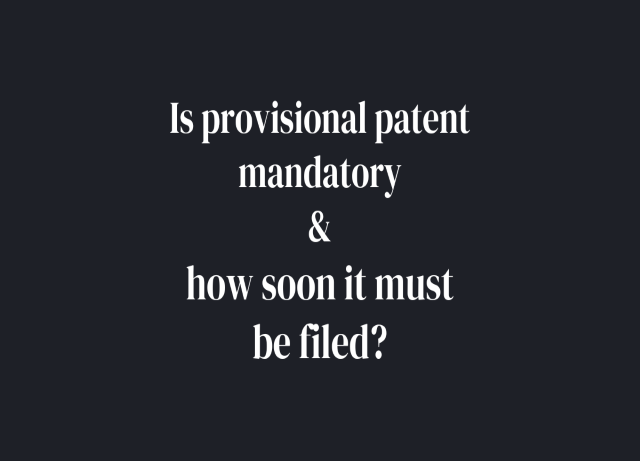It is not mandatory to file a provisional patent mandatory application, but doing so always confers additional benefits on the applicant, including interim protection, cost savings, and a host of other advantages.
IS A PROVISIONAL PATENT APPLICATION IS REALLY NECESSARY?
In India, all aspects of the patenting process, including filing, drafting, prosecution, and litigation, are governed by the Patents Act of 1970. The same Act specifies two kinds of patent applications that can be filed: provisional and complete. As its name suggests, a provisional patent application is a temporary application that is typically filed when an invention is in its very early stages and does not include any detailed specifications. On the other hand, a complete patent application is filed when the patent is ready for application in the industry in question in its entirety.
A provisional patent application, as opposed to a complete patent application, is simpler to file, and it does not involve the time-consuming process of drafting claims or specifications in great detail. This is because the provisional patent application is not examined by the patent office. A provisional patent application offers you 12 months to determine whether proceeding with your application is financially and time-wise worthwhile, and the same period can be used to conduct research and development on the idea to produce the most optimal form.
The filing of a provisional patent application offers a number of advantages that work in the favour of the inventors, while having only a few drawbacks. After the filing of a provisional patent application, the inventor is even allowed to begin marketing the products with the label “Patent Pending.” This would serve to notify both the general public and any potential rivals that the product in question is currently the subject of further development by its creator, who is working toward obtaining a patent for it. As a result, no one would be allowed to try to market a similar product during this time.
The filing date of the provisional application is always considered the priority date for a patent application; the filing date of the complete application is never considered the priority date for a patent application. In the event that another invention that is conceptually similar is created in the future, the applicant will have an advantage because of this. Not only in India, but by filing a provisional specification, an inventor can simultaneously apply for patents in other Paris Convention nations with the same priority date. A provisional patent application is more cost-effective than a full patent application since the filing fee for a provisional patent is a lot lower than the filing fee for a full patent. Moreover, a provisional patent application can be filed more quickly.
A provisional patent can be filed as soon as a person develops an idea and plans to invent or create something novel, useful, and non-obvious. Learn when and how to file for a provisional patent by reading on.
HOW SOON MUST A PROVISIONAL PATENT BE FILED?
A provisional patent mandatory provides a legal safeguard for an invention. It enables the inventor to file a patent application without disclosing all of the invention’s details. A provisional patent application is the first step to acquire the final patent grant. In India, a provisional patent must be filed within 12 months of the invention’s first public disclosure. This includes selling the invention, exhibiting it at a trade fair, and publishing it in a scientific publication. For an invention to qualify for a provisional patent, it must be novel, useful, and non-obvious. Additionally, the invention must fall under the statutorily defined categories of patentable subject matter.
According to the Patents Act of 1970, the filing of a provisional patent is not obligatory; nonetheless, doing so is still highly helpful in the long term in order to safeguard your patent. A provisional patent allows the applicant a period of time of one year to further develop his or her invention, and it does not require the full disclosure of the details of an invention as it is filed in order to obtain interim protection from the possibility of future infringement and prosecution. The patent office does not review provisional patents, and they do not become enforceable until a normal or complete patent application is submitted to the office. Furthermore, a provisional patent allows the inventor to establish an early filing date for the patent, which can be useful in the event that the invention is later patented in another country. Additionally, it can provide the opportunity for the inventor to affix the phrase “patent pending” to the invention, which may dissuade others from attempting to replicate the innovation.
A provisional patent mandatory application can be filed by an applicant at any time prior to the submission of a regular or complete patent application. However, in order to secure an early priority date, it is recommended to file a provisional patent application as soon as the opportunity presents itself. The fee for submitting a provisional patent application in India is not a set amount; rather, it fluctuates based on the degree of difficulty of the invention, the number of claims that are submitted. In most cases, the approval process for a provisional patent application in India might take anywhere from six to nine months to complete. The period could be shorter or longer depending on the kind of innovation and the volume of work being done at the Indian Patent Office (IPO).


